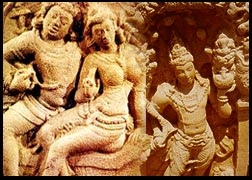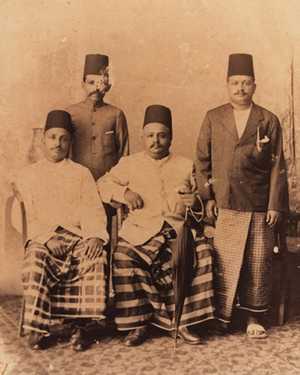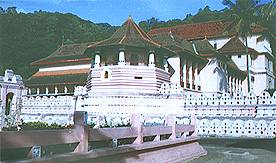|
 The
traditional Maldive naming convention seems to be remarkably similar
to the Sri Lankan Sinhala naming convention. As a result of contact
with other Sri Lankan peoples and various Indian ethnicities such
as Chola and Bengali, what Maldivians now have as a naming system
can best be described as lacking in convention. The
traditional Maldive naming convention seems to be remarkably similar
to the Sri Lankan Sinhala naming convention. As a result of contact
with other Sri Lankan peoples and various Indian ethnicities such
as Chola and Bengali, what Maldivians now have as a naming system
can best be described as lacking in convention.
The
Maldive Personal Name: A generation ago, most people were
not commonly known by their birth names. Instead they were called
by an alternative name such as Dohuttu, Lahuttu, Tutteedi, Kudamaniku,
or Don Goma.| details |
The Maldive Surname: Maldivians have always been mystified
by the surname. There is an array of reasons for this.
Firstly, the Maldivian word for surname, vanan, is the
same as that for nickname. Evidently the prophet Mohamed frowned
upon nicknames, or so many Islamic scholars taught in the Maldives.
Consequently it was believed that surnames were sinful. | Details |
|
This article outlines the naming conventions of
Sri Lankan ethnicities:
Sinhala: The Singala
community usually have two or three types of names. The first is called
the ge (Sinhala for house or clan, pronounced "gay") or family
name while the second is the personal name of the individual. There
could be more than one personal name. The third is the surname. Urbanised
Sinhala these days invariably have a surname. There are still many
rural Sinhala who have just the prefixed ge name and one or
more personal names.
The ge name may indicate the place from which
their family originated, the title or profession of the head of the
family or any other special characteristic of the family that prevailed
at the time the ge name was adopted.

Ancient sculpture: Sri Lanka |
When Antu and I briefly lived in the Maldives we
had a Sinhala housemaid who was called Pathirannahelage Piyaseeli.
This indicates that Piyaseeli was from the house of Pathirannahe.
A connecting -la was usually added between this and the suffix -ge.
Piyaseeli did not have a surname. I once worked with a Sinhala man
called Kaluhandhilage Hemachandra Silva. In this case Hemachandra
had the surname Silva.
Unfortunate
meanings
The
traditional Maldive name of Huttu or Hutthu, a variant of
Tuttu causes some embarrassing confusion in Sri Lanka. The
name has an unfortunate meaning in Sinhala related to female
private parts.
Police
names: Gunasekara was a Sri Lankan policeman seconded
to train the Maldive police force in the 1950s. After a spell
in Malé, Gunasekara returned home for a holiday. To
his wife's horror, Gunasekara's usually colourful vocabulary
had become even louder, bolder and filthier since his return.
Mrs Gunasekara finally asked her husband what was going on.
Gunasekara told his wife he was simply practising the names
of Maldive policemen in case he forgot.
Harassed
nurses: Like many Maldivians who travel to Sri Lanka seeking
medical treatment, Kaasilabbage Kaluhutthu turned up at a
Colombo hospital and was asked by the nurses what his name
was. Kaluhutthu said his full name and the nurses refused
to attend to him thinking he was a pervert out to harass them.
|
The prefixed ge name is carried down through
all descendants irrespective of whether they are male or female. Sinhala
women usually adopt the surname of the husband after marriage but
keep their prefixed family or ge name intact.
This naming format is remarkably similar to the
traditional Maldive format in which there was an actual person called
Kaasilabbage Kaluhutthu
The seemingly indispensable house names (usually
ending with -ge) as part of a person's identity in the Maldives
of today may be related to this naming heritage.
Tamil: Sri Lankan
Tamils usually use two names, the first representing their father's
name and the second representing their own. E.g.: Mahadhevan Muththusaamy
indicates that the individual's name is Muththusaamy and he is the
son of Mahadhevan. The daughter of Mahadhevan Muththusaamy would then
become Muththusaamy Kamalaraani, where the daughter's name is Kamalaraani
and is prefixed by the name of her father. Men and women use the same
naming structure but women sometimes adopt the husband's name after
marriage.
Some Maldivians have this types of names too. E.g.:
Donumaru Tuttuhokko where Tuttuhokko was the son of Donumaru.
Moors: Known to
Maldivians as Soalhiyaa, Moors who are Sri Lankan Muslims of
mainly Arab origin, have multiple methods of naming. Rural Moors use
their father's name as a prefix, similar to the Tamils, differing
in only by the fact that they may use more than one name for the prefix.
Culturally the Moors are very similar to the mainly
Hindu Tamils.

A group of Sri Lankan
Moors circa late 19th Century: From left: Ahmed Lebbe
Marikar Alim Abdul Majeed, "Cheque Book" Mohamed Ismail, Wappu
Marikar Abdul Jabbar, Mohamed Lebbe Marikar Hajiar Mohamed Shareef
(source:
Fazli Sameer's photo album). Women are highly segregated
in this conservative Arab-loving society and would not appear
in the same photo as men.
Maldive businessmen copied these modes of dress in the early
20th Century. This photo could easily pass as that
of a middle-class Maldive group of the time.
|
Both the personal name and the father's name may
have a host of titles prefixed to them. For instance Slema Lebbe Marikar
has a son called Sinna Lebbe Achchi Marikar. The son would be called
Slema Lebbe Marikar Sinna Lebbe Achchi Marikar. Here Lebbe (Islamic
priest) Achchi (one who has performed the haj pilgrimage) and Marikar
(trading agent) are titles. Nevertheless they are considered part
of the name. The British colonial administrators had immense difficulty
with this system and often called Moors by the address of their businesses
(E.g.: Number Forty Two Old Moor Street). Slema and Sinna are localised
forms of the Arabicised Jewish name Sulaiman and the Arabic name Hassan
respectively.
The names Mohamed or Ahmed are commonly used across
the board as first names for male Moors while the names Fathima or
Sithy or Ummu or Noor are used for females. Moors have a tendency
to give more than one name for their offspring. This usually arises
from the fact that leading members of both spouses' families take
part in contributing these names. Modern Moors living in urban centres,
have adopted the use of the surname as is used here in the West.

Temple of Buddha's tooth relic, Kandy: Sri Lanka |
Some Moors from areas that were within the dominions
of the Kandy kings until Kandy was annexed by the British in 1815
still use the Sinhala -ge naming convention.
Malays: Sri Lankan
Malays who are mainly Muslim but not Moorish usually have Western-style
surnames. However they have a tendency to use the prefix Tuan for
males and Gnei for females as a standard similar to the Mohamed and
Fathima of the Moors.
Following the pre-Islamic Pagan Arab convention,
Islam does not encourage the giving up of the family name by women
after marriage. However most Malay and even Moorish women have adopted
the Western convention of taking their husband's name.
Burgher: Burghers
are essentially Christian descendants of Portuguese, Dutch and British
who intermarried with the local Sinhala, Tamil or Moors. They conform
to the Western convention of naming where the surname is carried down
the line. As in the West, Burghers may have more than one personal
name. Women, adopt the surname of the husband after marriage.
Christians: Sri
Lankan Christians who are mostly descended from converts from Sinhala
Buddhists, Muslim Moors and Tamil Hindus are not usually regarded
as a separate ethnicity. They are more likely to adopt the Western
naming convention keeping their surnames running down the lineage.
However, some of them may still carry their prefixed -ge names,
if they are Sinhala. Some Tamil Christians still maintain the Tamil
convention of keeping their father's name as a prefix.
The Moorish converts are not accepted as Moors by
other Moors once they have converted and are usually regarded as Tamils.
The Muslim Moors are very insular and would ostracise their female
family members if they marry outside an arranged marriage even to
another Moor.
|
|
 |
Plenteous in
prosperity,
Thou, Beauteous in grace and love,
Laden with corn and luscious fruit
And fragrant flowers of radiant hue,
Giver of life and all good things,
Our land of joy and victory,
Receive our grateful praise sublime, Lanka! we worship
Thee.
Thou gavest us Knowledge and Truth,
Thou art our strength and inward faith,
Our light divine and sentient being,
Breath of life and liberation.
Grant us, bondage free, inspiration.
Inspire us for ever.
In wisdom and strength renewed,
Ill-will, hatred, strife all ended,
In love enfolded, a mighty nation
Marching onward, all as one,
Lead us, Mother, to fullest freedom. |
|
|

